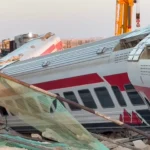New satellite research has revealed that Sudan’s paramilitary Rapid Support Forces (RSF) are constructing a vast earthen wall around the besieged city of el-Fasher, effectively tightening the noose on more than 300,000 civilians trapped inside. The findings, published by Yale University’s Humanitarian Research Lab (HRL), suggest that the RSF is creating what analysts call a “literal kill box,” designed to prevent civilians from fleeing and to cut off essential supplies such as food and medicine.
According to satellite imagery analyzed by HRL, more than 31km (19 miles) of berms—large raised earth banks—have been built since May 2025. These defensive walls are strategically positioned in RSF-controlled territory outside the city, which has been under siege for over a year. El-Fasher is the last major stronghold of Sudan’s army in Darfur, making it a key target for RSF forces in the brutal civil war that erupted in April 2023.
The Sudan Doctors Network has accused the RSF of deliberately targeting civilians during its latest offensive. Dr. Mohamed Faisal Hassan told the BBC that “heinous and deliberate” attacks on residential areas and the central market have killed dozens. “Yesterday there was a shelling in a civilian area down in the city centre that ended up killing almost 24 civilians and injuring 55 people, among them five women,” he said. He also described a massacre at one of el-Fasher’s largest hospitals, where patients and medical staff were bombarded.
The HRL report traces the construction of the berms in phases:
- A 9km wall was erected between July 14–24.
- A 6km stretch followed between August 3–19.
- A 7km barrier was completed earlier, between May 5 and July 12.
- Construction is ongoing on a 9km section between August 13–27.
In total, the walls form a partial ring encircling el-Fasher, with a 22km semi-circle to the west and north, and additional fortifications extending north and south along key eastern roads. Researchers warn that this physical blockade will intensify siege conditions, further restricting who and what can enter or leave the city. Already, humanitarian agencies have been unable to deliver aid for months, and civilians are enduring constant bombardments, food shortages, and collapsing medical care.
Local civilians describe life in el-Fasher as a choice between “slow death by starvation or certain death while fleeing.” Thirty-seven-year-old schoolteacher Halima Hashim, a mother of four, told AFP: “We have no money. Staying is like a slow death, but leaving is dangerous.”
The HRL also documented destruction in Alsen village, which appears to have been largely wiped out during berm construction between May and July. In addition, the RSF has targeted critical infrastructure, including a water treatment facility near the city’s airport. Though damaged, researchers believe the plant remains partially operational.
The RSF, which has long been accused of atrocities in Darfur, including ethnic cleansing of non-Arab communities denies targeting civilians. However, eyewitness accounts, medical reports, and satellite evidence suggest otherwise. “Some civilians are trying to escape the city but sadly, they are being targeted and killed by the RSF forces,” said Dr. Hassan.
If el-Fasher falls, analysts warn that the RSF will control all of Darfur, a scenario that could push Sudan toward partition, with the RSF and the Sudanese army each ruling separate governments.
Former Central Darfur governor Adeeb Abdel Rahman Youssef, now working with the NGO People to People, has appealed to the UN Security Council to intervene and protect civilians. But as construction on the RSF’s encirclement wall continues, the humanitarian situation in el-Fasher grows more desperate by the day.














Leave a comment